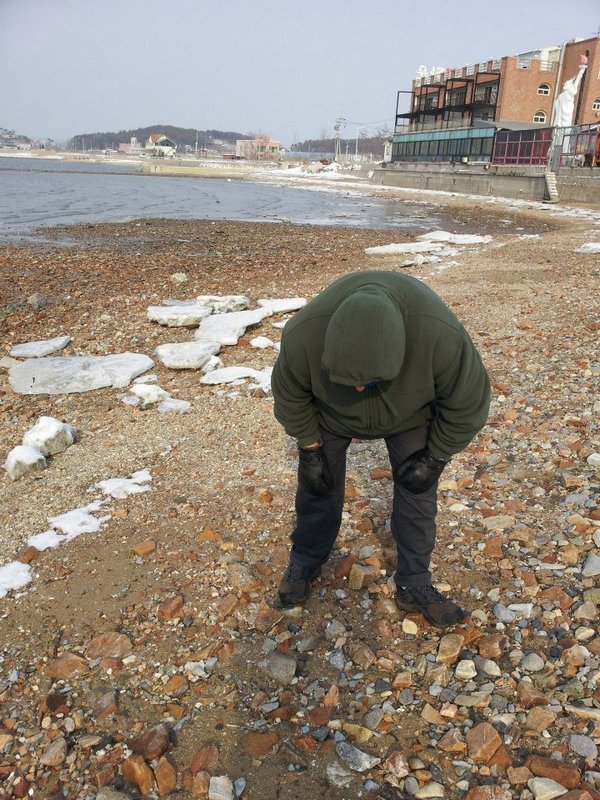In John B. Lee’s study, there are piles of stones, cobbles to pebbles. He’s a collector, no doubt mystifying endless airport security agents monitoring his luggage. One wonders about this, except that stones are mnemonic devices (this one means a day on the beach in Korea with my son and his son). And words are like stones, bearing the same trace mineral flecks, striations, layers, conglomerates and evidence of former life. You put them together and a mysterious meaning radiates (call it a poem). John is a frequent contributor to these pages. He’s the poet laureate of Norfolk County where I was born. He lives in Port Dover on Lake Erie, home of what was once the world’s largest freshwater fishing fleet (oddly shaped boats made of steel, called turtlebacks). He hosted the the April Extravaganza on the Lake, when NC Contributing Editor Sydney Lea and myself journeyed thither and read and grown men were heard to use the word “beauty” as if it were a real thing like a Porsche or an Audemars Piguet wristwatch. After which we drove down the lake to Highgate for a second reading, gossiping about the loves and suicides of famous southwestern Ontario writers, stopping to look a graves or the farm where John grew up. Reading John’s poems like a similar marvelous adventure.
dg
——-
Suseuk — Viewing Stones
my son, my grandson and I
were walking
the gravelly shores
of the Yellow Sea
on Daebun Island
looking west through amber sky
west to the entirely imaginary far-away
coast of mainland China
the sun
shining like a dulled brass gong
hung in soundless heaven
over the low-tide mudflats of Korea
and we were
looking to gather up
the most interesting stones
and only recently empty shells
the small cochlear conches
that hold the ocean winds of the world
as poems might hold
a meaningful breath
at the moment of deep-breath knowing
and I have gathered
my own little tea bowl
of chalk and silvery anthracite
carrying home the light of hope
brought here from these broken mountains
and that scaling off of iron oxide
from the water-loud coves
with their coming in and going away
of moon-drawn amplitudes
that swallow the road and drown the ankles
where the beach turns to vanish under
the afternoon drop-shadows
of the great engines of the sea
and as I hold council here
with silent beauty of granite
and pink rock
cobbled with dead creatures
who cling, barnacled
to the underbelly of a time-crushed
stratum and substratum
of cold vermillion
I think back
to the finding
when our three shades crossed
like the slow dampness of dragged black cloth
and there is this consolation to loss
the way memory
brightens
the shades and hues of meaning
like wave wash on dry rock
and tomorrow’s freeze
that set the coast
in hard-white unwalkable shards of dropped ice
what we’d seen
beneath the heavy burden of winter
unpacking its load
on the threshold of a second morning
made everything
unavailable to the hands
but there
the heart reached through
Timmy’s Down the Well
as I am conscious
of the perils
of living in a world
that is bellum
and full with the falsity
of the fierce and terrible yawp of war
I send out
the kinder dog
of my most beautiful thought
and I am
wagging memory at important windows
I am barking
at the scriptoriums
of mad leaders
where oak drawers slide shut
on the keepsakes of life
I am howling
at the Lupercalia of a romantic moon
where light
and the mirror of light
are drawing in the muddy skirts
of my hometown waters
while the deeper ambitions of love
arrive and leave in waves
like the bridal bed
evenings and mornings
of warmed dreamers
who wake and sleep
in the swan tuck of angels
my son
who works and thrives
in the government regions of Seoul
tells me
his school is at the epicenter
of the animosity of big guns
training their dark zeroes
at the soul of the city
and I know—
any sunrise
has its own Gallipoli
all moonsets in yellow air
might break the shining glass
with a seismic whump of a great shattering noise
where we are all bad hammers
we are all
the pelt and pummel
of red stone and sharp sticks
on soft flesh
Mr. President
you with the burning tongue
take your crimson axe away
from my broken brain
I am here
singing from the common tree
among the magpies
among the crows
I come
palm line open to the blue ceiling
give the greater graves
the balm of a short shadow
I cast my longer darkness
onto the green recline
of an out-of-reach light
where we both breathe
we all breathe
and into this lasting language
of even the most ancient poets
I say, let Caesar weep
on the senate stair
let him weep at the river
I refuse
the map lines of his desire
I bark
at the buoyant well holes
of my body
and am dangerous with a different
and far more powerfully resonant echolalia
of the resounding voice of a father’s love
—John B. Lee
———————————
John B. Lee is the author of over sixty published books. In February he won the Winston Collins / Descant Prize for Best Canadian Poem for the second time. Inducted as Poet Laureate of the city of Brantford in perpetuity, he was also recently appointed Poet Laureate of Norfolk County where he now lives in Port Dover, a fishing town located on the south coast of Lake Erie.


Beautiful. Love the imagery, the details: “The sun shining like a dulled brass gong hung in soundless heaven.” Love it!